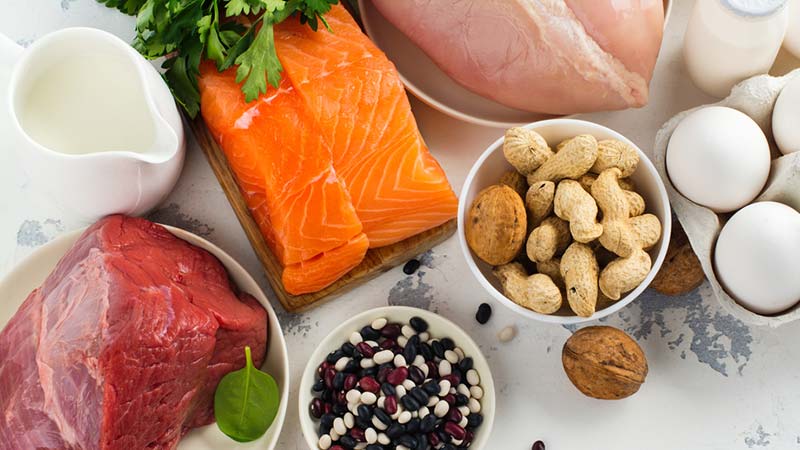
Five good reasons to make sure you’re getting enough of this vital macronutrient, especially for athletes and other active people.
Everyone is an athlete, and adequate protein is a universal nutritional requirement for all.
Athletes usually require more energy in the form of overall calories, and thus their protein needs are higher too.
Unfortunately, the nutritional status of most people is poor, whether they exercise or not. Low levels of various nutrients are common due to low intake of healthy whole foods and higher junk food consumption. Protein is often a missing component to a healthy diet.
We tend to think of protein as being important for building muscles and strength, which is true. However, even inactive people require modest amounts of protein each day. That’s because muscles do more than provide the means for movement — they also are important for immune, circulatory, hormonal and other activities that require protein.
For muscle activity, protein has many functions:
- Protein enhances the anabolic actions necessary in muscles following exercise, and is a vital part of recovery.
- Although all amino acids are important, leucine is often highlighted as a marker for muscles, and found in higher amounts in beef, pork, nuts and seeds, healthy dairy, fish and beans.
- Protein can help prevent muscle injury, as long as the muscles are not abused by excessive volumes and/or intensity of exercise.
- A healthy protein status is important for athletic performance.
- Balancing protein intake with healthy fats and unprocessed carbohydrate foods can help improve muscle function and reduce excess body fat.
Optimal protein intake can be usually accomplished by consuming 20-40 grams of protein in each meal or substantial snack.
Whether we’re trying to develop strength, build more muscle, or maintain current body condition, the International Society of Sports Nutrition recommendations include 1.4-2.0 grams protein/kg body weight/day. For those performing regular strength-training sports, 2.3-3.1 grams/kg/day, or more, may be necessary.
For example, an healthy and active 160-pound person may require upwards of 170 grams per day.
Examples of daily protein needs:
- For daily protein intake of 128 grams. The protein foods that would provide this include three eggs and cheese at breakfast, a salad for lunch with a hefty serving of turkey, and salmon for dinner.
- For a daily protein intake of 106 grams: two eggs for breakfast, a chef’s salad for lunch, and a sirloin steak for dinner.
- For 90 grams of protein: two eggs at breakfast, tuna salad for lunch, and lamb for dinner.
Reasons people may need additional amounts of protein.
- Larger body frames or high muscle-mass types.
- Those performing more extreme sports.
- Growing children.
- Those who are over 40 to prevent muscle-mass loss.
However, more is not necessarily better as protein intake above one’s needs won’t help, and could stress the gut. It’s important to estimate your personal needs to determine the amount that works best. This can be done by comparing different intakes with energy levels, post-workout muscle recovery, MAF Tests, gut function, and other signs and symptoms.
Protein is necessary for balancing fats, stabilizing blood sugar and insulin, and regulating nutrients and hormones. It’s important for digestion, nervous-system maintenance, building new cells throughout the body and fueling the immune system, among other functions.
For serious competitive athletes, an evening protein supplement can help in muscle recovery and development. While food consumption in the evening is typically not recommended, during times of intense training or a buildup to key endurance races, consuming about 30-40 grams of an easily digested protein like egg white powder as a shake can be helpful. Avoid this if it causes intestinal upset.
While studies tend to separate protein needs for endurance performance and strength training, everyone benefits from both types of fitness. This does not necessarily mean increasing muscle bulk and added weight.
In addition to consuming protein foods at mealtimes, benefits can occur when consuming protein before or after exercise. Protein can be helpful during training sessions or competition when nutrients besides water are necessary, and can also be added to a carbohydrate drink. This can reduce muscle soreness, and during hard training or competition, reduce muscle damage.
During long workouts and races, endurance athletes can consume approximately 0.25 g of protein/kg body weight per hour, along with their carbohydrate intake. For those using protein before, during, or after workouts, or to supplement a healthy diet, the two best sources are:
Egg white powder.
This protein source may be ideal because it’s less processed, highly digestible, and easy to incorporate in shakes and recipes such as homemade energy bars.
Whey protein powder.
This protein source is not only readily assimilated but also contains cysteine, the building block for the powerful antioxidant glutathione. Be sure to buy the concentrate form not the highly processed isolate or hydrolyzed forms. Avoid products containing added sugar, flavorings, or other unnatural ingredients including synthetic vitamins.
Protein is an important part of any healthy person’s diet. If you’re active or an athlete it’s even more important to assess your needs and take appropriate steps to meet this crucial requirement.








